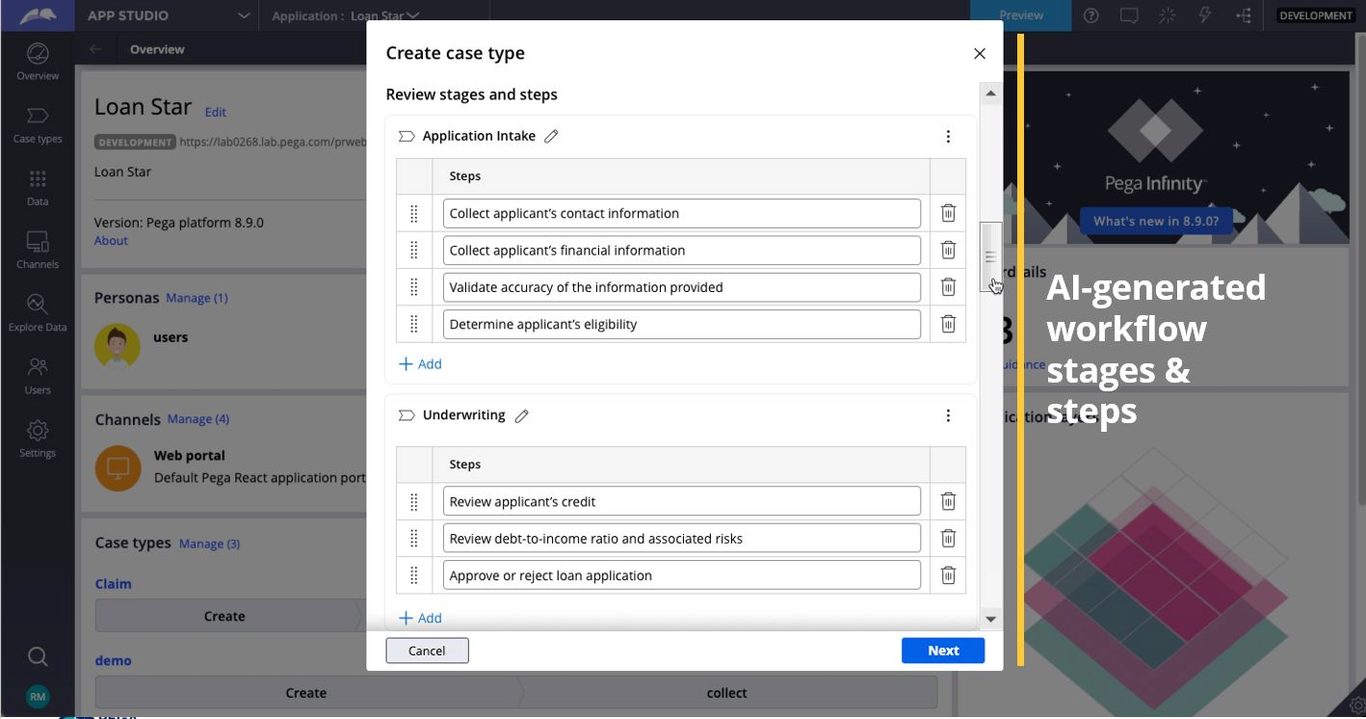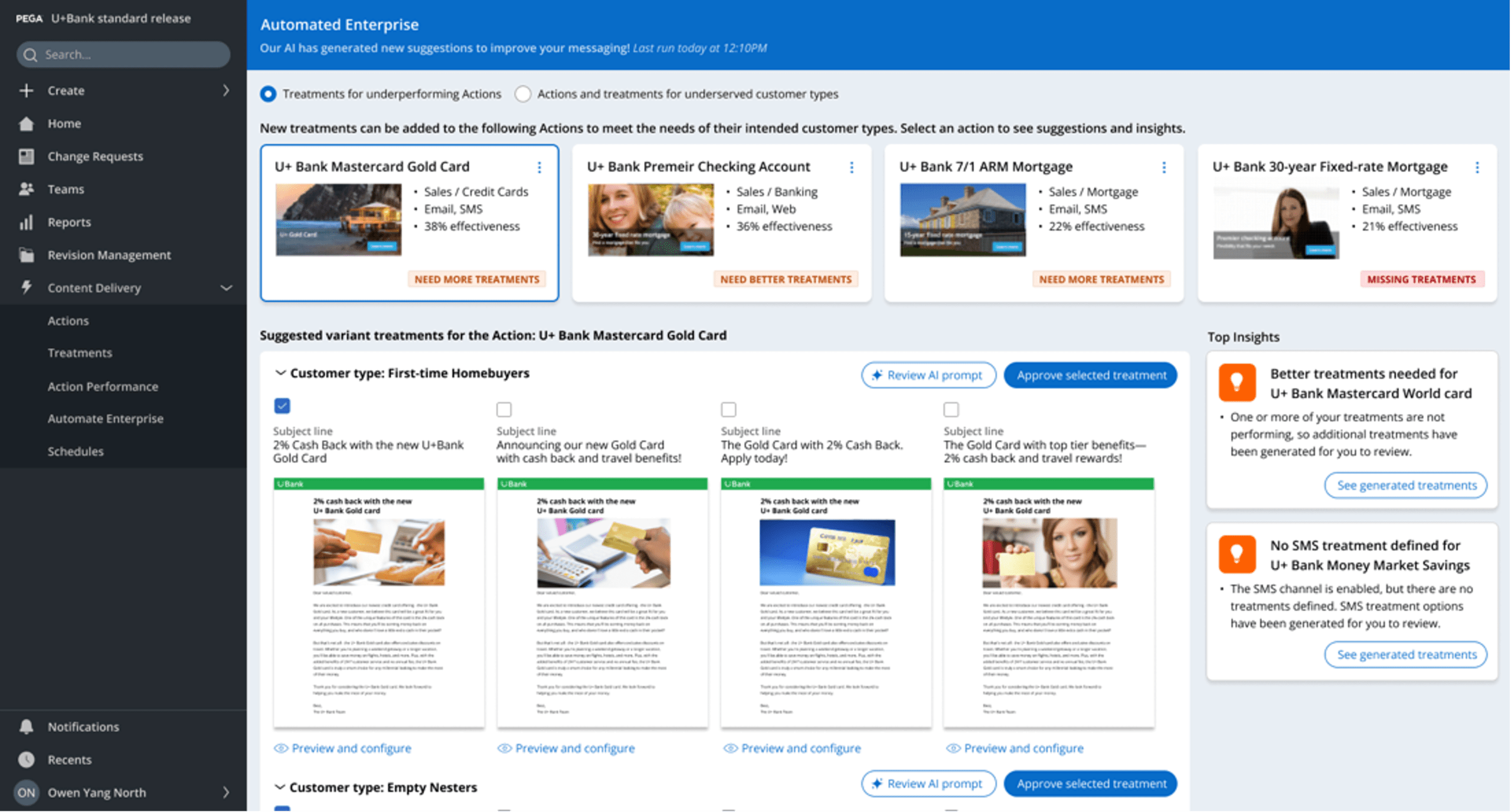The recent innovations in Generative AI have inspired – and perhaps concerned – us all. For my teenage children, this inspiration takes the form of ChatGPT writing them rap songs about our dog going to space (along with trying to get it to do their homework for them).
For business leaders, this inspiration and concern takes the form of rethinking entire industries. Rethinking what it looks like to engage their market, service their customers, and run their business.
We at Pega believe that Generative AI technologies, like GPT-3, will revolutionize all aspects of business – provided they can be applied in a responsible way with governance built in. Over the past few weeks, we’ve engaged with innovative leaders at many of our clients who share that vision: that Generative AI represents a massive opportunity to improve the customer experience, increase productivity, and cut costs. Applying this latest generation of AI models is an important step on the path to the Autonomous Enterprise.
That’s why today we announced new integrations with Generative AI models which will power new capabilities across our low-code platform for AI-powered decisioning and workflow automation.
Enabling the future of business with Generative AI
We’re investing in new Generative AI powered capabilities across of business, building on the established mission and differentiation of our low-code platform for AI-powered decisioning and workflow automation. These are just scratching the surface of what’s possible. The opportunity is revolutionary, and I expect rapid innovation to emerge and evolve in this area.
With the first steps of this mission, we see Generative AI enabling:
1. Automatic development of low-code applications.
Low-code developers will be able to take descriptions of their processes and data and instantly turn them into working business applications with automatically generated case types, data objects, and data models – generating a starting point for their applications with just a few words. We’ve basically given low-code developers access to an infinite library of process, case, and data model templates. This will both dramatically accelerate development and else empower a new generation of developers to create applications without technical expertise.
And when developers get stuck, instead of reading through pages of technical documentation and StackOverflow – they will be guided with contextual suggestions which come from AI-summarized help & training documents – which will be added into our new AI-assisted development panel introduced in Pega 8.8.

2. Faster, more personalized customer service.
Today, when a customer calls or chats a business, often the representative on the other end of the line needs to comb through months or years of transcripts and tickets to get the baseline context needed to provide the best service possible. Now, AI can arm contact center representatives with quick summaries of all call & chat transcripts, past interactions, and relevant knowledge articles to provide contextual guidance, enabling them to deliver more personalized customer interactions, quicker.
3. Customer engagement content generation, on-the-fly.
Customer engagement leads and marketers will be able to use AI to generate new variant treatments – subject to human review and approval - that are designed to appeal to people who are not well served by any of the existing treatments in the system. Businesses spend massive amounts of time and millions of dollars each year on content generation, and we see a future where AI can help generate personalized, relevant content faster & at higher margin, all while ensuring that the human stays in the loop.

4. Instant insights from operational data.
Back-office leaders need visibility into what’s going on across their processes. With Generative AI, they will be able to build data visualizations & reports from conversational prompts (e.g. show me all claims that are high risk of fraud and over $2,000).
In addition, today when back-office employees get a new assignment, they’re slowed down by reading through all of the relevant transactions, documents, and conversations related to that piece of work. In the future, AI will be able to give them a quick summary of what they need to know in order to begin processing, quickly.
And this is just the beginning. We’ve architected our integration with Generative AI to ensure that our clients can both optimize and govern its use, but also to ensure that we can continue to innovate new ways of making developers, marketers, and end users more effective. Our vision is to apply AI pervasively and responsibly across our platform – by introducing new AI-powered capabilities with every release. We’ve done that in the past with Process AI and Voice and Messaging AI. We’ll continue that journey as we introduce AI-powered Process Mining capabilities. For us, AI isn’t a cartoon or a brand name – it’s a powerful set of technologies that can be deployed in pragmatic ways across your business.
And with as many ideas Generative AI has inspired, it has brought up just as many questions and concerns. Business leaders need a trusted partner in applying AI across their business safely. Pega is a leader in Responsible AI, and provides a complete framework for managing risks and ensuring all customer engagement is empathetic & free of bias. New Generative AI capabilities will be integrated with Pega’s Responsible AI framework – which will include human-in-the-loop controls, monitoring, and governance.
I’m incredibly excited to begin this journey. All of these innovations, and more will be featured at PegaWorld iNspire user conference this June 11-13 at the MGM Grand in Las Vegas.
Learn more about Pega's GenAI capabilities today.

